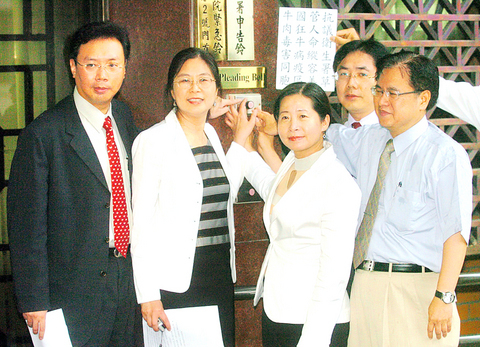Not waiting for orders from the government to do so, some retail chains such as the Far Eastern Geant (愛買吉安) have began voluntarily removing US beef products off their shelves.
The move comes as opposition politicians and the government squabble over whether or not US beef is safe after that country confirmed another case of made cow disease on Friday.
"As long as there are safety concerns, we don't think there should be any exceptions," said Brenda Yen (嚴必文), public relations manager for the Taiwan's third largest hypermarket operator with 13 stores around the nation.

PHOTO: CHEN TSE-MING, TAIPEI TIMES
Citing their high quality-control standards, the decision, implemented yesterday, will cost Far Eastern Geant millions of NT dollars by halting sales of its two tonnes of US beef in stock, Yen said.
Some local supermarkets and those in Shin Kong Mitsukoshi Department Store (新光三越), Breeze Center (微風廣場) and Pacific Sogo Department Store (太平洋崇光百貨) have echoed the Consumers' Foundation's (消基會) call to halt the sale of US beef.
However, other major retailers, including Carrefour, RT-Mart (
Costco, the nation's largest importer of US beef, has sold an average of 22.5 tonnes of US beef, or NT$10 million (US$320,000), per week since the import ban as lifted on April 16.
US beef sales at some retailers last weekend more than doubled as consumers stockpile the meat for fear that beefs supplies will dwindle and prices will rise.

A preclearance service to facilitate entry for people traveling to select airports in Japan would be available from Thursday next week to Feb. 25 at Taiwan Taoyuan International Airport, Taoyuan International Airport Corp (TIAC) said on Tuesday. The service was first made available to Taiwanese travelers throughout the winter vacation of 2024 and during the Lunar New Year holiday. In addition to flights to the Japanese cities of Hakodate, Asahikawa, Akita, Sendai, Niigata, Okayama, Takamatsu, Kumamoto and Kagoshima, the service would be available to travelers to Kobe and Oita. The service can be accessed by passengers of 15 flight routes operated by

Chinese spouse and influencer Guan Guan’s (關關) residency permit has been revoked for repeatedly posting pro-China videos that threaten national security, the National Immigration Agency confirmed today. Guan Guan has said many controversial statements in her videos posted to Douyin (抖音), including “the red flag will soon be painted all over Taiwan” and “Taiwan is an inseparable part of China,” and expressing hope for expedited reunification. The agency last year received multiple reports alleging that Guan Guan had advocated for armed reunification. After verifying the reports, the agency last month issued a notice requiring her to appear and explain her actions. Guan

GIVE AND TAKE: Blood demand continues to rise each year, while fewer young donors are available due to the nation’s falling birthrate, a doctor said Blood donors can redeem points earned from donations to obtain limited edition Formosan black bear travel mugs, the Kaohsiung Blood Center said yesterday, as it announced a goal of stocking 20,000 units of blood prior to the Lunar New Year. The last month of the lunar year is National Blood Donation Month, when local centers seek to stockpile blood for use during the Lunar New Year holiday. The blood demand in southern Taiwan — including Tainan and Kaohsiung, as well as Chiayi, Pingtung, Penghu and Taitung counties — is about 2,000 units per day, the center said. The donation campaign aims to boost

The Central Weather Administration (CWA) said a magnitude 4.9 earthquake that struck off the coast of eastern Taiwan yesterday was an independent event and part of a stress-adjustment process. The earthquake occurred at 4:47pm, with its epicenter at sea about 45.4km south of Yilan County Hall at a depth of 5.9km, the CWA said. The quake's intensity, which gauges the actual effects of a temblor, was highest in several townships in Yilan and neighboring Hualien County, where it measured 4 on Taiwan's seven-tier intensity scale, the CWA said. Lin Po-yu (林柏佑), a division chief at the CWA's Seismological Center, told a news conference